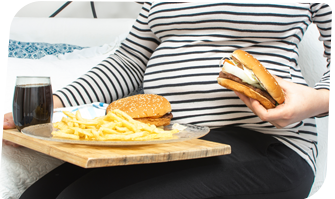Many of us have experienced the feeling of being bloated. It often occurs after an indulgent weekend or during festive seasons, where larger amounts of eating and drinking take place.
However, bloating is not always linked to overeating and some people may suffer from bloating on a regular basis – even when they haven’t had a large meal.
Bloating can be very uncomfortable but, thankfully, there are a number of ways you can change your diet and lifestyle to help tackle this unwelcome feeling.
Rennie takes a look at five areas that cause problems and suggests some simple ways to help you beat the bloat…
Don’t eat too much in one sitting
That feeling of being overly full after a large meal is familiar to us all.
To avoid this, rather than eating one large meal, eat less and more often.
Along with eating smaller meals, chewing your food correctly also has two key benefits – it helps reduce the amount of air you swallow with the food, and it also makes you eat a lot slower, reducing your intake of food.
Ensure you eat plenty of fibre
Constipation can often increase the symptoms of bloating, so ensure you are eating plenty of cereals and vegetables to keep yourself regular.
Constipation is a common digestive problem and can be a result of a number of different causes such as not eating enough fibre. Other things that can cause constipation include:
- A change in eating habits
- A lack of exercise
- Avoiding going to the toilet
- Not drinking enough liquids
- Anxiety
Check if you’re intolerant to certain foods
Eating foods that you’re intolerant to may lead to an excess of gas production, an unsettled stomach, and bloating.
If you think you may be intolerant to certain foods, consult with your doctor or a dietician who can advise you on changes to your diet.
Make use of probiotics
Probiotic supplements can often help improve and reduce symptoms of gas and bloating in people with digestive problems.
Probiotic bacteria is essential for a well-functioning intestine and consuming fermented foods should be a regular habit.
However, this does depend on the individual as well as the type of probiotic strain used.
Always read the label. If symptoms are severe or prolonged, you should consult a doctor or pharmacist. If you are pregnant, medicines can affect the unborn baby. Always talk to your doctor or pharmacist before taking any medicine during pregnancy.
















